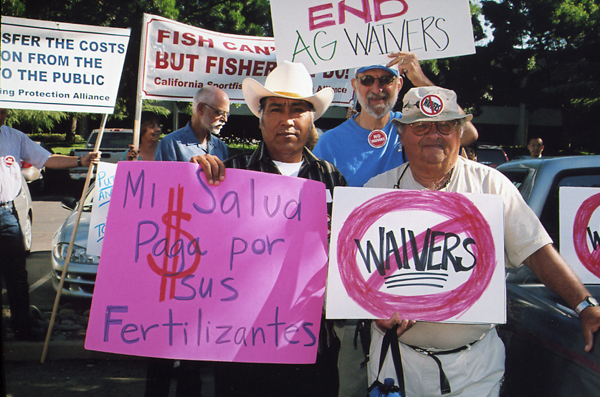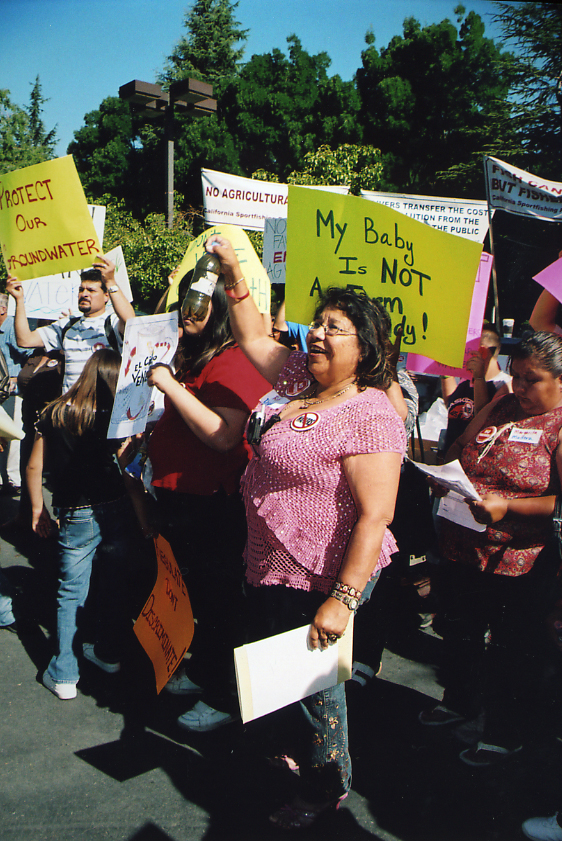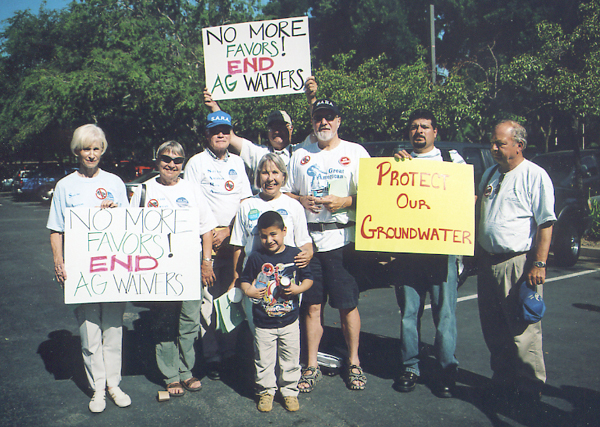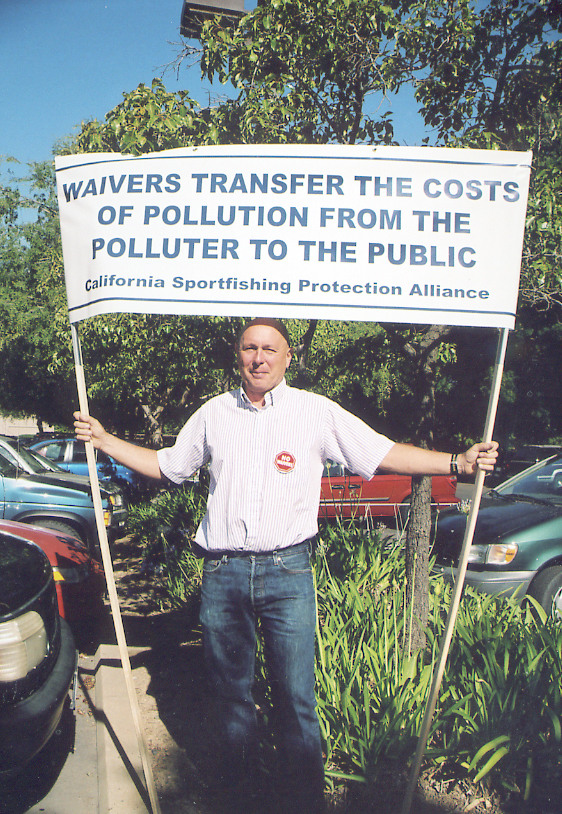From the Open-Publishing Calendar
From the Open-Publishing Newswire
Indybay Feature
Delta in Crisis, but Water Board Extends Ag Waivers for Five Years
Here's my final article on the ag waivers hearing, with some photos included. This version includes some data on pesticides and some quotes that weren't in the original article I wrote right after the event.

The Central Valley Regional Water Quality Control Board voted on June 22 to extend waivers for discharges from irrigated farm land for five years, in spite of pleas from a coalition of anglers, farmworkers and environmental justice advocates to subject agribusiness to the same general discharge permit that others have to abide by.
That waiver adopted in July 2003 provided for the establishment of voluntary coalitions of farmers to tackle agricultural pollution. Unlike industry, businesses and municipalities, agricultural discharges have been unregulated and not subject to regulation by general waste discharge permits. This has allowed agribusiness to pollute Central Valley waterways with a toxic brew of pesticides, herbicides, fertilizers and sediment.
The board, in a 5 to 2 vote, built a little bit more accountability into the waiver process by requiring the submission of an electronic list of the members of the coalitions. In addition, the Board Executive Officer may ask for maps delineating the participants and non-participants in the coalitions. The time line for joining up with a coalition is now December 31 - and after that the individual dischargers would be subject to individual permits, again at the discretion of the Executive Officer.
Board members Robert Schneider, Karl Longley, Alson Brizard, Katherine Hart, and Paul Bettencourt voted for the waiver, while Christopher Cabaldon and Dan Odenweller voted against it.
Bill Jennings, executive director of the California Sportfishing Protection Alliance, said the Board missed its opportunity to protect the environment and the public, deciding instead to protect agribusiness.
“I'm glad that the board finally reiterated the requiring of lists of the member of the coalitions, but it is not really an advance over the 2003 waiver,” said Jennings. “It would have been an advance if mandatory management plans were required when water quality standards aren't met, but that would still have been only a modest step.”
He emphasized, “By continuing the waiver, the Board effectively ceded the state's responsibility for water quality to industry advocacy groups. The waiver amounts to a subsidy to farmers, a transfer of the cost of pollution from the dischargers to the public. It is time to show as much compassion for the victims of pollution as it is does for the dischargers.”
Carrie McNeill, the Deltakeeper, had a similar reaction to the Board's controversial vote. “They are saying they are going to take baby steps when we have a major ecosystem crisis, with a food chain collapse in the Delta while the groundwater is not fit to drink in many Central Valley communities,” she stated.
McNeill, Jennings, Laurel Firestone of the Center for Race, Poverty and the Environment, Mindy McIntire of the Planning and Conservation League and many others described the waiver program as a big failure, emphasizing that virtually no improvements had been made since the waiver program had gone into effect.
In fact, in the past three years the situation in the Central Valley and Delta has become increasingly worse, including the documentation by federal and state scientists of a food chain crash on the Delta, the listing of the green sturgeon under the Endangered Species Act, and increasing reports of groundwater and wells polluted by pesticides and fertilizers.
On the other hand, some farmers at the hearing, though happy that the Board approved a waiver rather than a general waste discharge, were upset that the board had decided to introduced even a limited amount of accountability into the waiver program by requiring the coalitions supposedly monitoring and dealing with agricultural pollution to maintain membership lists.
The Board's staff and Central Valley farmers tried to portray the waiver program to date as some sort of success, although opponents of the waivers pointed out how state agencies have documented increases - rather than decreases - in the use of toxic chemicals and their presence in Valley waterways.
For example, A 2005 U.C. Davis study of Pixley Slough at Eight Mile Road in Stockton found that EPA standards for pesticides and toxic metals had been exceeded many times in one year. They found standards for diazon were exceeded 14 times, cadmium 7 times, copper 11 times, zinc 4 times and lead 25 times. In addition, they found 64 different pesticides in the drainage water to Grantline Canal alone.
The California Department of Pesticide Regulation also found pesticides present in 96 percent of the water sites tested, while farm pollutants have been found in drinking supplies for 16.5 million Californians in 46 counties.
“The most appropriate, effective means for regulating irrigated land impacts on surface and groundwater is a general order of waste discharge requirements like all other industries,” was the recommendation of the Bay Keeper, California Sportfishing Protection Alliance and California Coastkeeper Alliance.
The turnout by fishing, farm worker and environmental groups was very impressive. Before the meeting, a coalition of over 130 organizations submitted a strongly worded letter to the board calling on them to submit agriculture to general waste discharge permits. Also, around 80 people holding signs held a rally outside of the meeting room before they went in to testify about the impact of toxics on fish and other aquatic life, ground water and the health of rural communities.
Dozens of farmworkers and family members took the day off to testify to the dramatic impact that polluted runoff from pesticides and fertilizers have had on drinking water supplies and the health of thousands of rural Californians. Fertilizers have leached into groundwater, causing high levels of nitrate contamination in the drinking water supply over much of the Central Valley.
“Our communities are the ones who are paying the costs of this waiver,” said Ruth Martinez, a Ducor Water Board representative and member of Asociacíon de Gente Unida por el Agua (AGUA), a grassroots coalition of communities who traveled over 600 miles to protest the agricultural waiver.
“We pay while they poison us,” she said as she held up a bottle of brown, disgusting looking groundwater from the Ducor water supply. “We pay for drinking water that has been poisoned by these agricultural companies. Then, we pay even more money for bottled water because we can't drink our tap water. And then we have to live with the rashes, the hair loss and the threat to our health.”
Other farmworkers, including Marita Salazar, Maria Orozco and Gustavo Aguirre, testified to the alarming rate of cancer in many rural communities. Many communities, such McFarland in the San Joaquin Valley, are considered “cancer clusters” because of the abnormal rate of cancer and birth defects caused by agricultural contamination of groundwater supplies.
Fishing groups testified to the impact that agricultural pollution was having on them also. “Dirty, unclean water from agricultural waste water is killing people, fish and animals,” said Bob Strickland, president of United Anglers of California. “With the decimation of the food chain, fish species in the Delta are crashing and pollution has been shown to be one of the major causes. Please help us get this water cleaned up by not approving the waivers for another five years.”
Members of the California Striped Bass Association, Save the American River Association (SARA), Federation of Fly Fishers, Friends of the River and other groups also showed at the hearing in force to oppose the waiver.
David Nesmith of the Environmental Water Caucus summed up his feelings about the meeting:
“The Board seems bent on ignoring California clean water requirements when agriculture is the major polluter of the Delta and pollution is one of the three main causes of the Delta food chain decline,” he said. “The way the board approaches this problem denies the reality of the people being hurt by the pollution. Being in the hearing room was an Orwellian experience; the Board says they are enforcing the law when breaking it and says they're improving water quality when they're making it worse.”
The California Highway Patrol was also there in force with five officers, adding to the Orwellian atmosphere of the hearing. One officer claimed that the rally outside the board hearing office was illegal because the clean water advocates had no permit and the signs were of an “illegal size.” Nonetheless, folks weren't intimidated and proudly displayed their signs in opposition to the waiver.
I was appalled that the board approved the agricultural waivers. The Delta food chain is in crisis, farmworkers living in areas with contaminated water are getting sick and dying of cancer, the Central Valley Rivers are less healthy than they were three years ago, and the members of the Board just don't seem to care!
Jennings said his group is planning to appeal the granting of the waivers to the State Water Resources Control Board. If the appeal doesn't produce results, they intend to file a lawsuit against the state.
“The board had the opportunity to be the protector or executioner of the Delta. They chose to be its executioner,” Jennings concluded.
For more information, contact: Bill Jennings, California Sportfishing Protection Alliance, 209-938-9053,



Add Your Comments
We are 100% volunteer and depend on your participation to sustain our efforts!
Get Involved
If you'd like to help with maintaining or developing the website, contact us.
Publish
Publish your stories and upcoming events on Indybay.
Topics
More
Search Indybay's Archives
Advanced Search
►
▼
IMC Network


